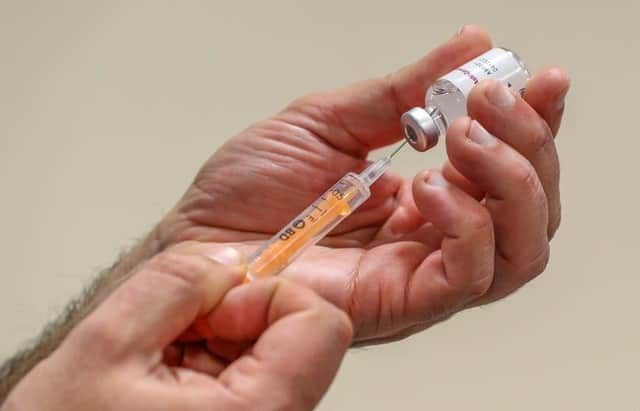Vaccination experts are 'not recommending' Covid jabs for under 18s, says cabinet minister


A number of reports have suggested that the Joint Committee on Vaccination and Immunisation (JCVI) will not advise the Government to go ahead with a vaccination campaign for under-18s.
The UK’s medicines regulator, the Medicines and Healthcare products Regulatory Agency (MHRA), has already approved the use of Pfizer/BioNTech Covid-19 vaccine among children aged 12 and over in the UK.
Advertisement
Hide AdAdvertisement
Hide AdBut, officials have not yet confirmed whether the vaccination programme will be extended to children once the adult vaccine campaign is complete.
International Trade Secretary Liz Truss said: “Of course the Government will look very closely at the JCVI’s recommendations. It is my understanding that they are not recommending the vaccination of under-18s and we will be saying more in due course about that.”
Some academics have argued that the UK should follow the US and Israel and begin to vaccinate children to prevent outbreaks in schools, while others have questioned the ethics of offering vaccines to children when it would have little clinical benefit.
Advertisement
Hide AdAdvertisement
Hide AdCalum Semple, professor of child health and outbreak medicine at the University of Liverpool said that children’s chances of dying from Covid-19 are “one in a million”.
He said: “The risk of death is one in a million. That’s not a figure and plucking from the air, that’s a quantifiable risk.
“We know in wave one and wave two put together there were 12 deaths in children – in England, Scotland, Wales and Ireland, put together – and that is rare because there are about 13 to 14 million children in the UK.
“So we’re talking about vaccinating children here mainly to protect public health and reduce transmission.
Advertisement
Hide AdAdvertisement
Hide Ad“And it’s accepted that teenagers who are biologically more like adults are more likely to transmit.
“But younger children really are not – they are about a half to a third less likely to acquire the virus and similarly to pass it on.
“So we’re now coming into a really interesting ethical and moral debate here about vaccinating children for the benefit of others.”
Earlier this week, one of the scientists behind the Oxford AstraZeneca jab said children should not receive a Covid-19 jab before vulnerable people in other countries have been vaccinated.
Advertisement
Hide AdAdvertisement
Hide AdProfessor Sir Andrew Pollard said: “At the moment, the children themselves are relatively low risk of serious infection. Then the second question is when to vaccinate children.
“And my view is that we really ought to be using those doses, at this moment, for people in low and middle income countries who are at the greatest risk of severe disease.
“(We should) consider the ‘when’ after the rest of the world’s most vulnerable have been protected.”
